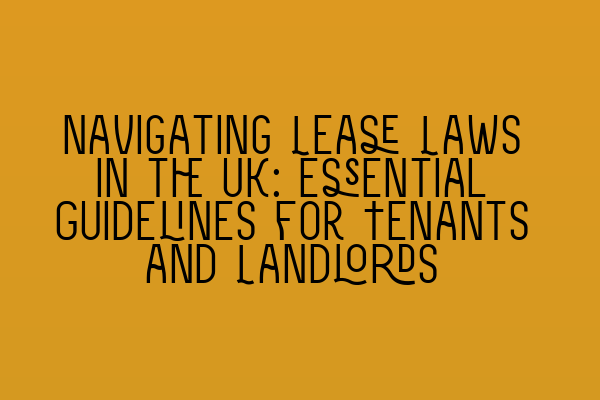Navigating Lease Laws in the UK: Essential Guidelines for Tenants and Landlords
Welcome to our blog post on navigating lease laws in the UK. Whether you are a tenant or landlord, understanding the intricacies of lease laws is crucial for a successful tenancy. In this article, we will provide you with essential guidelines to help you navigate through these laws efficiently.
The Importance of Understanding Lease Laws
Lease laws in the UK govern the relationship between tenants and landlords, ensuring fair rights and responsibilities for both parties involved. It is essential for tenants to familiarize themselves with their legal rights and obligations, while landlords need to understand their legal obligations towards their tenants.
By understanding these laws, tenants can protect themselves from unfair treatment, unlawful evictions, and ensure that their rights are respected throughout their tenancy. Landlords, on the other hand, can avoid legal disputes, penalties, and potential damage to their reputation by complying with all relevant lease laws.
Key Guidelines for Tenants
1. Read and Understand the Lease Agreement
The lease agreement is a legally binding document that outlines the rights and responsibilities of both parties. Make sure to carefully read and understand the terms and conditions before signing. If you have any concerns or questions, seek legal advice to ensure you fully comprehend the agreement.
If you encounter any ambiguous or unfair clauses, discuss them with the landlord or their representative. It’s essential to have a clear agreement to avoid future disputes.
2. Know Your Rights as a Tenant
As a tenant, you have certain rights protected by law. These may include the right to a safe and habitable property, protection from unfair eviction, and the right to have repairs carried out by the landlord. Familiarize yourself with these rights to ensure you are being treated fairly.
Stay informed about any recent updates in UK property laws to stay up-to-date with any changes that may affect your tenancy. You can check out our article on Updates in UK Property Laws: Key Changes and Implications for more details.
3. Communicate Effectively with Your Landlord
Open and effective communication with your landlord is key to maintaining a healthy landlord-tenant relationship. If issues arise during your tenancy, report them promptly and in writing to ensure a documented record. This will help in addressing disputes or repairs in the future.
Should you face any legal challenges or disputes throughout your tenancy, refer to our comprehensive guide on Legal challenges in property transactions: A comprehensive guide for expert advice.
Key Guidelines for Landlords
1. Draft a Clear and Comprehensive Lease Agreement
As a landlord, it is your responsibility to draft a lease agreement that clearly outlines the terms and conditions of the tenancy. Ensure that all relevant clauses, such as rent payment, property maintenance, and notice periods, are clearly stated to avoid any future misunderstandings.
2. Understand Your Legal Obligations
Being aware of your legal obligations is crucial for fulfilling your duties as a landlord. This may include maintaining the property in a safe and habitable condition, carrying out necessary repairs promptly, and protecting the tenant’s deposit in a government-approved deposit scheme.
For further guidance on how to avoid common pitfalls and dominate property law questions, check out our article on Dominate Property Law Questions: Avoiding Common Pitfalls.
3. Keep Records and Documentation
Maintaining thorough records and documentation of all interactions with your tenants is crucial. This can include copies of the lease agreement, invoices for repairs, notice letters, and communication logs. These records will prove invaluable in case of disputes or legal proceedings.
If you need assistance with any land law matters or require expert advice for your property transactions, our article on Land Law Revision Tips: Ace Your Exam Preparation can provide you with essential tips and insights.
Conclusion
Navigating lease laws in the UK can be intricate, but by following these essential guidelines, both tenants and landlords can ensure a smooth and legally compliant tenancy. Remember to stay informed about any legal changes, communicate effectively, and seek professional advice when needed.
For landlords and tenants alike, having a solid understanding of leases laws will contribute to a positive and mutually beneficial relationship. For more information on various property law topics, visit our website at SQE Property Law & Land Law.
Related Articles:
- Updates in UK Property Laws: Key Changes and Implications
- Legal challenges in property transactions: A comprehensive guide
- Dominate Property Law Questions: Avoiding Common Pitfalls
- Land Law Revision Tips: Ace Your Exam Preparation
- Mortgages and land law: Essential considerations for property transactions
